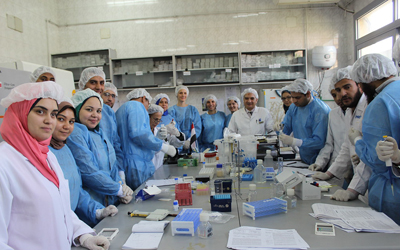
These long-term investments contributed to:
- The accreditation of six NLQP satellite laboratories across Egypt by ISO/IEC 17025 standards. The lab further managed to sustain its accreditation over the years.
- The nomination of NLQP as an OIE reference laboratory for AI in June 2021.
- NLQP now has the capacity to perform complete genome sequencing of AI viruses. Furthermore, NLQP shares all genetic data of the A/H5N1 and A/H9N2 viruses under the “Global Initiative on Sharing All Influenza Data” (GISAID), which enables rapid dissemination and sharing of sequence data with other reference laboratories, OFFLU network, Open Flu database of AI viruses and influenza researchers all over the world.
- NLQP became capable of producing vaccine seed from local strains using the reverse genetic technique.

2) Animal Health Research Institute (AHRI)
Since 2016, AHRI has been engaged in the detection of MERS-CoV with support from ECTAD that includes:
- Practical training on sampling collection and handling for laboratory staff.
- Standardization of MERS-CoV testing protocol.
- Supporting the lab with the required materials and equipment (kits for ELISA, and molecular diagnosis including PCR and sequencing).
- Chemiluminescence micro-plate reader machine was delivered to AHRI to improve the detection capacity and quality of testing for the serological samples against MERS-CoV viruses.
3) Central Laboratory for the Evaluation of Veterinary Biologics (CLEVB)
The interventions of ECTAD have also yielded tangible improvements in the national capacity for monitoring the efficacy of AI vaccines used in the poultry industry.
This support enabled CLEVB to substantially reduce the average time required for the evaluation of AI vaccines from 98 days to about 40 days by undertaking a parallel evaluation of 45 vaccine batches simultaneously without a waiting list.
All partners including the private sector were greatly satisfied with shortening the duration required to know the results of the vaccine evaluation and hence ensuring the availability of vaccines in the market.

